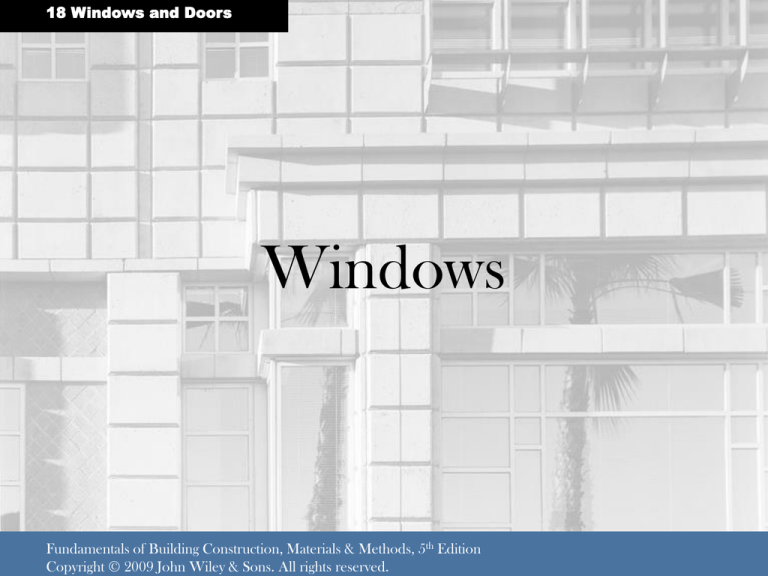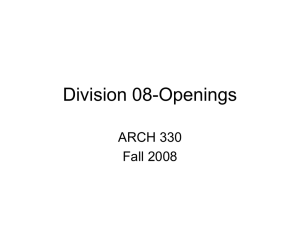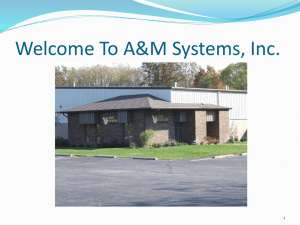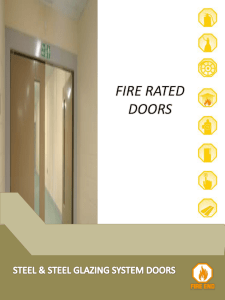
18 Windows and Doors
Windows
Fundamentals of Building Construction, Materials & Methods, 5th Edition
Copyright © 2009 John Wiley & Sons. All rights reserved.
Windows
Window Terminology
• Window is thought to have originated from “wind-eye”
• Windows have changed from open holes in earliest
buildings to an intricate sophisticated mechanism with
many layers of controls
• Prime window is a window made to be installed
permanently in a building
• Storm window is removable window added to improve
thermal performance
• Combination window includes operable and fixed
portions with screens
• Replacement windows install in existing openings
• The top of window frame is called head jamb or
simply head, the two verticals are called side jambs or
jambs and the bottom portion is called a sill. Casings,
stools and aprons provide the finishing
Fundamentals of Building Construction, Materials & Methods, 5th Edition
Copyright © 2009 John Wiley & Sons. All rights reserved.
Window Nomenclature
Windows
Types of Windows
• Fixed windows
–
Least expensive and least likely
to leak air or water
• Hung windows
–
–
Maybe single hung or double
hung depending on one or two
moving sashes
Sashes were hung by
counterweights in the past but
now use springs
• Sliding windows
–
–
–
Essentially like a single hung
window on the side
Inherently stable operable
windows because of tracks
Can be designed in many sizes
Fundamentals of Building Construction, Materials & Methods, 5th Edition
Copyright © 2009 John Wiley & Sons. All rights reserved.
Windows
Types of Windows
• Projected windows
–
–
–
Includes casement, awning, hopper, tilt/turn and
inswinging windows
Sashes rotate outwards or inwards from the
frames and therefore need structural stiffness
when open
Projected windows can be opened to full area
unlike windows with sliding sashes
• Casement windows
–
–
Assist in catching passing breezes inducing
ventilation
Generally narrow but can be joined to one
another or with fixed windows
Fundamentals of Building Construction, Materials & Methods, 5th Edition
Copyright © 2009 John Wiley & Sons. All rights reserved.
Windows
Types of Windows
• Awning windows
–
–
–
Can be broad but not usually
tall
Can protect an open window
from water during rainstorms
Lend themselves to building
block approach when
designing window walls
Fundamentals of Building Construction, Materials & Methods, 5th Edition
Copyright © 2009 John Wiley & Sons. All rights reserved.
Awning and Fixed Window
Creating a Patterned Wall
of Glass
Windows
Types of Windows
• Hopper windows
–
–
More common in commercial
buildings than in residential
Can protect an open window from
water during rainstorms
• Tilt/Turn windows
–
Have elaborate but concealed
hardware that allows window to be
operated as either a casement or a
hopper
• Types of windows and airtightness
–
Projected windows have pliable
rubber weatherstripping (unlike
brush type) that seals by
compression providing good air
tightness
Fundamentals of Building Construction, Materials & Methods, 5th Edition
Copyright © 2009 John Wiley & Sons. All rights reserved.
Windows
Types of Windows
• Windows in roofs
–
–
–
Windows in roofs are flashed for
watertightness
They may be fixed – skylights
They may be operable – roof
windows
Fundamentals of Building Construction, Materials & Methods, 5th Edition
Copyright © 2009 John Wiley & Sons. All rights reserved.
Windows
Types of Windows
• Glass doors
–
Large glass doors may slide on tracks
or swing open on hinges
• French doors
–
–
–
Open fully and are more welcoming
Not easy to regulate air into the
room because it can’t be kept
partially open
Prone to more air leakage
• Sliding doors
–
–
Can be partially opened to regulate
air
Can only open half its area
• Terrace doors
–
Half leaf can swing open
Fundamentals of Building Construction, Materials & Methods, 5th Edition
Copyright © 2009 John Wiley & Sons. All rights reserved.
Windows
Types of Windows –
Larger Buildings
•
•
•
•
•
Pivoting windows
Side-hinged windows
Top-hinged inswinging windows
Allows for inside washing of exterior glass surface
Devices limit amount of opening to reduce
damage
Fundamentals of Building Construction, Materials & Methods, 5th Edition
Copyright © 2009 John Wiley & Sons. All rights reserved.
Windows
Types of Windows –
Larger Buildings
• A commercial horizontal
strip window system
Fundamentals of Building Construction, Materials & Methods, 5th Edition
Copyright © 2009 John Wiley & Sons. All rights reserved.
Windows
Window Frames
• Wood
–
–
–
–
–
–
–
Tradition material for
housing
Good thermal insulator
Low coefficient of
thermal expansion
Consistently strong
Moisture related
shrinkage a problem
Requires repainting
often and is subject to
decay
Wood frame windows
can be clad with
aluminum or vinyl
Wood Windows – Double
Hung and Triangular
Double Hung Wood
Frame Windows
Aluminum Clad Wood
Framed Window
Fundamentals of Building Construction, Materials & Methods, 5th Edition
Copyright © 2009 John Wiley & Sons. All rights reserved.
Windows
Details of Commercial Grade
Aluminum Framed Windows
Window Frames
• Aluminum
–
–
–
–
–
–
–
Strong, easy to form and join
Less vulnerable to moisture
damage
Attractive profiles and colors
Durable factory finishes
Require thermal breaks to reduce
heat flow
More costly
Mostly common in large buildings
Fundamentals of Building Construction, Materials & Methods, 5th Edition
Copyright © 2009 John Wiley & Sons. All rights reserved.
Windows
Window Frames
Aluminum Double Hung and Sliding
Window
• Aluminum
Cutaway Section of
Thermal Break
Fundamentals of Building Construction, Materials & Methods, 5th Edition
Copyright © 2009 John Wiley & Sons. All rights reserved.
Windows
.
Window Frames
• Commercial grade
aluminum windows
Fundamentals of Building Construction, Materials & Methods, 5th Edition
Copyright © 2009 John Wiley & Sons. All rights reserved.
Windows
Cutaway Sections of Plastic Framed
Windows
Window Frames
• Plastic
•
•
•
•
•
•
Becoming more common
Do not need painting
Provide good thermal resistance
Not as stiff or strong as other materials
Have high coefficient of thermal
expansion
PVC is the most common plastic used
• GFRP – Glass Fiber Reinforced Plastic
•
•
•
Framed produced by pultrusion
Strong, stiff and relatively low in
thermal expansion
More expensive
Fundamentals of Building Construction, Materials & Methods, 5th Edition
Copyright © 2009 John Wiley & Sons. All rights reserved.
Windows
Steel Frame Results in Narrow Sight
Lines
Window Frames
• Steel
–
–
–
Main advantage is strength which
permits sashes to be slender than other
materials
Corrosion is a problem so frames
would need to be coated or painted
More thermally conductive than wood
and plastic but less than aluminum
– Muntins
–
–
Glass in windows is divided into small
sections within each sash by muntins
It was necessary when large sizes of
glass were not common but is more
decorative now
Fundamentals of Building Construction, Materials & Methods, 5th Edition
Copyright © 2009 John Wiley & Sons. All rights reserved.
Windows
Window Frames
• Steel
Hot Rolled Steel
Window Frame
Sections
Cutaway of Steel
Framed Window
Fundamentals of Building Construction, Materials & Methods, 5th Edition
Copyright © 2009 John Wiley & Sons. All rights reserved.
Steel Framed Window
with Wired Glass Used
in Openings in Fire
Separations
Windows
Window Frames Comparisons
Fundamentals of Building Construction, Materials & Methods, 5th Edition
Copyright © 2009 John Wiley & Sons. All rights reserved.
Single Hung Aluminum
Framed Window Compared to
PVC Plastic Framed Window
Windows
Window Frames Comparisons
Impact of Window Frame to Overall U Values
of Windows
Coefficients of Thermal Expansion
Overall U-Factor1
Window Frame
Single-glazed
Double-glazed,
clear
Double-glazed,
low-e, argon gas
Aluminum, without thermal break
1.2
6.8
0.76
4.3
0.60
3.4
Thermal break aluminum
1.0
5.7
0.63
3.6
0.48
2.7
Steel
0.92
5.2
0.55
3.1
0.41
32.3
Wood, clad wood, vinyl
0.84
4.8
0.49
2.8
0.35
2.0
GFRP
0.65
3.7
0.44
2.5
0.27
1.5
1
2
o
2 o
U-Factor: Btu/ft -hr- F followed byW/m - K
Fundamentals of Building Construction, Materials & Methods, 5th Edition
Copyright © 2009 John Wiley & Sons. All rights reserved.
Windows
Manufacturer’s Catalog Details Showing Rough
Opening & Trim Requirements
Installing Windows
• Designers need to ensure
to provide rough
openings or masonry
openings for the windows
• Details need to be
considered to flash
openings
• Attachments/Anchoring
of windows to the frame
need to be taken into
account
Fundamentals of Building Construction, Materials & Methods, 5th Edition
Copyright © 2009 John Wiley & Sons. All rights reserved.
Windows
Installing Windows
• Aluminum-clad, wood
windows being installed
into a rough opening
constructed of thin steel
sections and plywood
Fundamentals of Building Construction, Materials & Methods, 5th Edition
Copyright © 2009 John Wiley & Sons. All rights reserved.
18 Windows and Doors
Doors
Fundamentals of Building Construction, Materials & Methods, 5th Edition
Copyright © 2009 John Wiley & Sons. All rights reserved.
Doors
Modes of Door Operation
Door Categories
• Exterior doors
•
•
Weather resistance is an
important criteria
Solid entrance doors, doors with
glass, screen doors, vehicular
doors, revolving doors. Most
common are swinging doors
• Interior doors
•
Passage of sound and fire are
important criteria
• Modes of door operations
•
Swinging, bifold, accordian,
sliding, overhead, coiling
Fundamentals of Building Construction, Materials & Methods, 5th Edition
Copyright © 2009 John Wiley & Sons. All rights reserved.
Doors
Typical Configurations for Wood
Doors
Wood Doors
• Stile-and-rail doors
• Flush doors
•
•
•
•
Solid core of wood blocks
Composite materials
Hollow core for interior uses in
residential
Three performance grades –
standard, heavy and extra heavy
duty
• Wood fiber composite material
• Pressed sheet metal doors
• GFRP doors
Fundamentals of Building Construction, Materials & Methods, 5th Edition
Copyright © 2009 John Wiley & Sons. All rights reserved.
Doors
Typical Configurations for Steel
Doors
Steel Doors
• Flush doors with painted sheet
steel are the most common type
• Steel doors come with hollow core
for interior and solid core for
exterior
• Steel doors and frames are
commonly manufactured and
specified according to Steel Door
Institute’s (standard steel doors)
and Hollow Metal Manufacturer’s
Standards (custom steel doors)
Fundamentals of Building Construction, Materials & Methods, 5th Edition
Copyright © 2009 John Wiley & Sons. All rights reserved.
Doors
Details of Hollow Steel Door Frames
Steel Doors - Frames
• Metal doors and most residential
doors are usually hinged on hollow
steel door frames
• Wood and aluminum frames may
be used
• Different types of anchors are
available to mount to different
frames
• With masonry they may be filled
with cementitious grout to provide
sound deadening and more tamper
resistant
Fundamentals of Building Construction, Materials & Methods, 5th Edition
Copyright © 2009 John Wiley & Sons. All rights reserved.
Doors
Steel Doors - Frames
• A steel flush door and
hollow metal frame, in a
concrete masonry exterior
wall
Fundamentals of Building Construction, Materials & Methods, 5th Edition
Copyright © 2009 John Wiley & Sons. All rights reserved.
Doors
Steel Doors - Frames
• In the event of a fire, this
fire door will automatically
close, protecting the elevator
lobby beyond
• The fire test label, required
for all fire doors, can be
seen affixed to the edge of
the door below the
uppermost hinge
Fundamentals of Building Construction, Materials & Methods, 5th Edition
Copyright © 2009 John Wiley & Sons. All rights reserved.
Doors
Custom Fabricated Door
Hardware
Fundamentals of Building Construction, Materials & Methods, 5th Edition
Copyright © 2009 John Wiley & Sons. All rights reserved.
18 Windows and Doors
Fenestration
Performance
Fundamentals of Building Construction, Materials & Methods, 5th Edition
Copyright © 2009 John Wiley & Sons. All rights reserved.
Windows
Window Testing
• Setting up a laboratory test
for window structural
strength and resistance to
wind pressures
• The metal apparatus is used
to measure deflection of the
window frame during the
test
• The glass is taped to prevent
it from shattering
Fundamentals of Building Construction, Materials & Methods, 5th Edition
Copyright © 2009 John Wiley & Sons. All rights reserved.
Windows
Window Testing
• Setting up a laboratory test
for window structural
strength and resistance to
wind pressures
• The metal apparatus is used
to measure deflection of the
window frame during the
test
• The glass is taped to prevent
it from shattering
Fundamentals of Building Construction, Materials & Methods, 5th Edition
Copyright © 2009 John Wiley & Sons. All rights reserved.
Windows
Performance Issues –
Impact Resistance
• Projectile damage to a
window wall resulting from
hurricane force winds
Fundamentals of Building Construction, Materials & Methods, 5th Edition
Copyright © 2009 John Wiley & Sons. All rights reserved.
Fenestration Performance
Details of Hollow Steel Door Frames
Performance
• Many other issues that need to be
taken into account in choosing
fenestration
–
–
–
–
–
–
–
–
–
–
Fire
Egress
Accessibility
Accidental breakage
Emergency escape
Structural performance
Resistance to wind and rain
Thermal performance
Impact resistance
Blast resistance
Fundamentals of Building Construction, Materials & Methods, 5th Edition
Copyright © 2009 John Wiley & Sons. All rights reserved.
18 Doors and Windows
MasterFormat Sections
For Windows and Doors
CSI/CSC MASTERFORMAT SECTIONS FOR WINDOWS AND DOORS
08 10 00
DOORS AND FRAMES
08 11 00
Metal Doors and Frames
Hollow Metal Doors and Frames
Metal Screen and Storm Doors and Frames
08 14 00
Wood Doors
Flush Wood Doors
Clad Wood Doors
Stile and Rail Wood Doors
08 15 00
Plastic Doors
08 50 00
WINDOWS
08 51 00
Metal Windows
Aluminum Windows
Steel Windows
08 52 00
Wood Windows
08 53 00
Plastic Windows
08 54 00
Composite Windows
Fiberglass Windows
08 60 00
ROOF WINDOWS AND SKYLIGHTS
08 61 00
Roof Windows
08 62 00
Unit Skylights
Fundamentals of Building Construction, Materials & Methods, 5th Edition
Copyright © 2009 John Wiley & Sons. All rights reserved.










